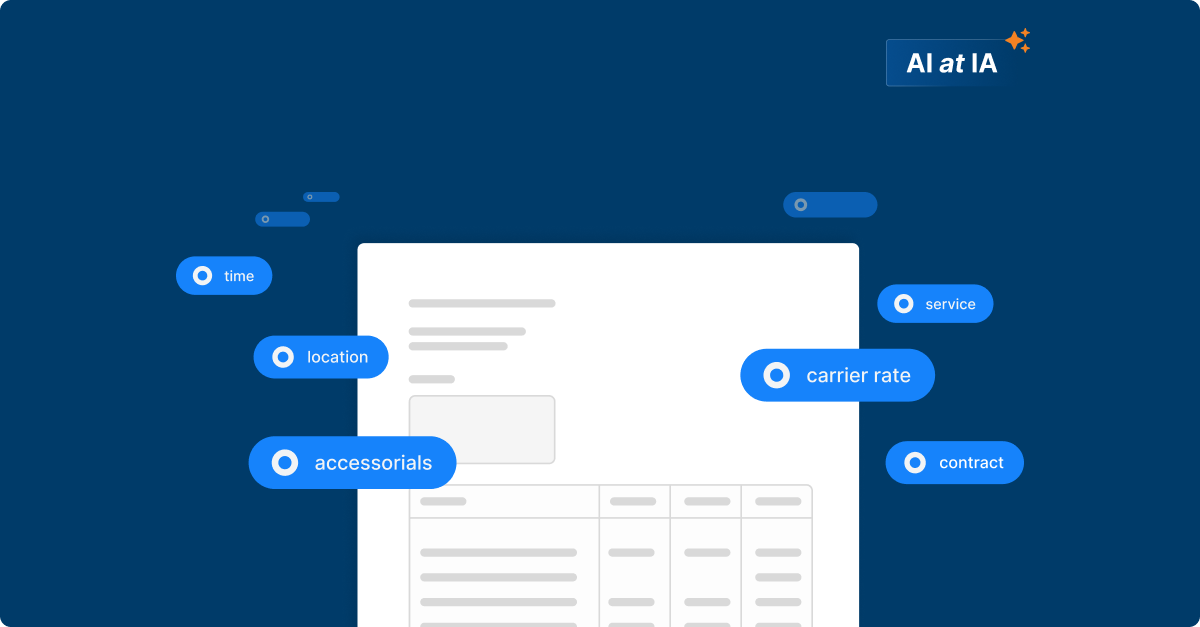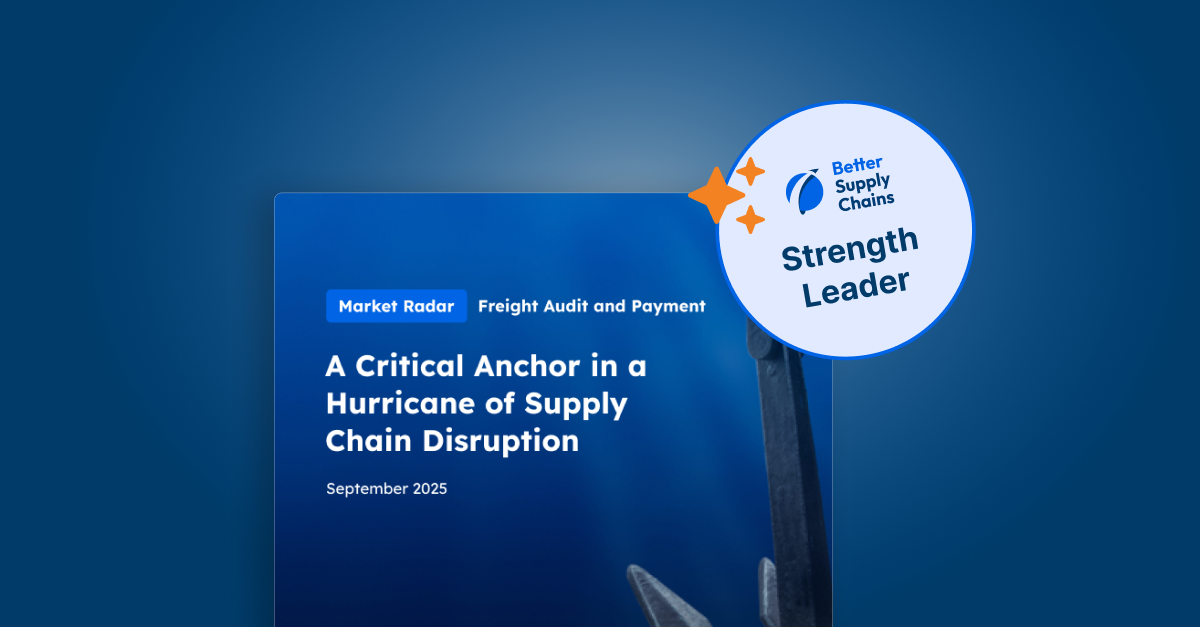Streamlining Carrier Relations with Optimized Invoicing and Payment

Building a thriving logistics operation is like nurturing a friendship. It's not just about the nitty-gritty of moving freight but about cultivating partnerships that help both sides grow.
Yet, just like in any relationship, minor misunderstandings can create rifts. Often, these misunderstandings spring from the seemingly simple tasks of invoicing and payment. A tiny oversight here, a minor inefficiency there, and before you know it, all that hard work in building trust starts to unravel.
Yet, there's good news: the industry is on the brink of a revolution. By optimizing invoicing processes with freight audit and payment best practices, it’s possible to transform carrier relations and elevate them from good to great. We’re going to show you how in this article.
Why Traditional Invoicing Habits Fall Flat in Modern Transport
Understanding the nuances of traditional invoicing is only half the battle. The real challenge emerges when we see how these invoicing issues play out, affecting the core of shipper-carrier relations. Let's dive deeper into these interconnected challenges and their far-reaching impacts.
Challenges in Traditional Invoicing: Delays, Disputes, and Manual Hassles
While tried and true, traditional invoicing methods come with many challenges. A significant 1 in 10 invoices end up delayed, casting a cloud over 30% of SMBs and their carrier relations. But the ripple effects continue: 10% of payments are relegated to bad debt or remain unpaid. Invoice disputes only add to the complexity. 49% originate from incorrect purchase orders, and 61% of late payments get snagged in administrative red tape. Moreover, despite our digital age, 77% of invoices remain in inboxes as PDFs or even as faxes, hard copies, or emails. As a result, businesses handling under 20,000 payments a year achieve on-time payments for only 24% of them.
The Domino Effect: How Invoicing Issues Impact Carrier Relations
Invoicing challenges aren't just administrative hiccups; they have real-world consequences that can profoundly impact carrier relations. Strained ties with carriers come with a cascade of downsides:
- Delayed Shipments – When relations sour, carriers might prioritize other clients. The result? Delays and disruptions in deliveries that potentially throw off a shipper's entire schedule.
- Increased Costs – A strained relationship can have financial implications. Carriers might push for higher rates or impose penalties, escalating transportation costs for the shipper.
- Reputational Damage – If disputes and delays become the norm over time, a shipper's reputation can take a hit. This reputational dent makes it increasingly difficult to secure reliable carrier services in the future.
Leveraging Optimized Invoicing and Payment for Revitalized Carrier Relationships
Peeling back the mechanics of invoicing and payment, we find a game-changer in optimization. It's more than just making things smoother; it's about reshaping carrier relations. Let's dive into the perks of optimized invoicing and see how tech becomes our secret weapon in this change.
Defining Optimized Invoicing and Its Benefits
Optimized invoicing goes beyond the traditional, aiming for smoother, less manual, and more accurate processes. In logistics, this often translates to using electronic invoicing or automation solutions, negating the inefficiencies and errors of manual processes. The ripple effects of this shift are palpable:
- Cost Reduction – Infrastructure costs are effectively reined in by intertwining optimized invoicing with warehousing and delivery processes.
- Efficiency – Exchanging invoices becomes a breeze, helping pinpoint the ideal inventory levels and their optimal placement in the supply chain.
- Accuracy and Speed: – Human errors, often a byproduct of manual data entry, are minimized, and the entire process gets a speed boost.
- Visibility – Real-time insights into invoice status offer unparalleled transparency in transactions.
Streamlining Invoicing Processes Enhances Efficiency and Accuracy
Think of the invoicing process like a well-oiled machine. Automation smooths out the bumps, while standardization keeps everything running in sync. Clear communication can iron out potential hiccups before they even start. With the right tools at hand to limit invoice discrepancies, it’s not just about doing things faster but smarter and with fewer hiccups.
Technology: The Cornerstone of Optimized Invoicing
The Logistics 4.0 era has transformed technology from a passive enabler into a potent force that drives change in invoicing. With technologies like AI, machine learning, the Internet of Things, and blockchain, the supply chain is experiencing a wave of unprecedented efficiency. Predictive analytics enable proactive strategies, while real-time tracking ensures that shipments are always under close watch. Blockchain technology offers increased transparency and trust, creating stronger carrier relations.
Optimized Invoicing and Payment Offers Powerful Benefits
Optimization in invoicing is a strategic practice that reshapes interactions between shippers and carriers, emphasizing mutual growth. Breaking down the tangible benefits reveals a promising pathway for both parties.
Elevating Transparency for Clearer Communication
Offering carriers access to real-time and historical data via a shared portal paves the way for trust. This open line of communication allows for the early detection of discrepancies, fostering a collaborative atmosphere to address and align invoice details. Ultimately, this transparency reduces unforeseen billing issues, ensuring smoother transactions.
Strengthening Financial Foundations: Enhancing Working Capital
Balanced payment strategies serve both parties. After aligning on an invoice, carriers receive payment promptly, typically within seven days. At the same time, shippers follow their established payment timelines. This balance ensures both parties have the robust working capital essential for sustained growth.
Efficiency at its Best: Reducing Administrative Overhead
Automation can greatly simplify the invoicing admin work. More than just speeding things up, it helps tidy up outstanding accounts, manage overdue invoices efficiently, and impressively ensures that over 99% of invoices are cleared on time.
The Path Forward with Optimized Invoicing
The logistics world is rapidly evolving, and the importance of carrier relations stands at its core. Yet, while these relations get cultivated over time, founded on trust and mutual understanding, small discrepancies in invoicing can ruin these relationships in seconds.
Having said that, the transformative power of optimized invoicing and payment offers hope. By addressing these challenges head-on and integrating efficient systems, like solutions provided by freight audit service providers such as Intelligent Audit, it's possible to secure these ties and ensure a smoother, more collaborative future. From comprehensive freight and small parcel auditing to business intelligence & analytics and machine learning, shine a light on the path to streamlined operations and strengthened carrier relations.
Embrace the future and get started with Intelligent Audit today.



